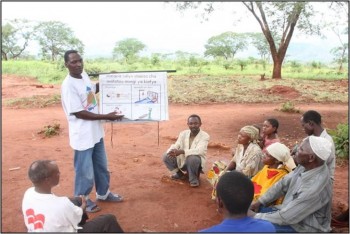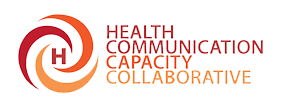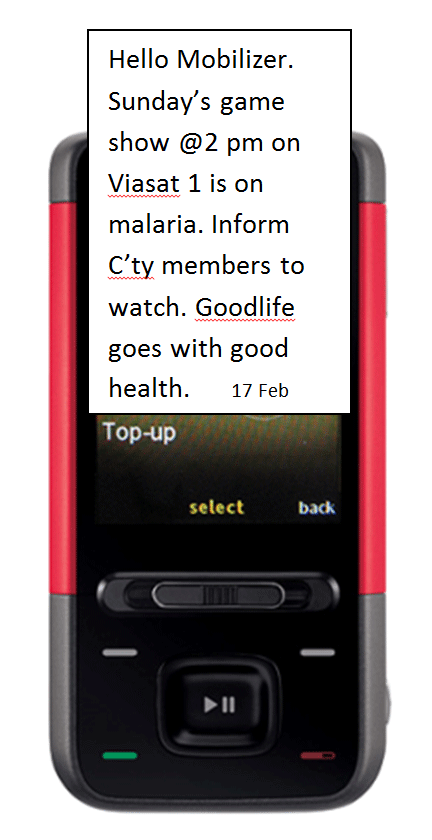Example: Identifying Strategic Approaches
COMMIT
The Communication and Malaria Initiative in Tanzania (COMMIT) was a multi-tiered project that worked at the national, community, and individual levels and employed a number of strategic approaches to foster social norms and self-efficacy around malaria prevention and treatment.

A community change agent (CCA) shows community members in Tanzania a flipchart about malaria. CCAs work through the USAID-funded COMMIT project. © 2014 JHUCCP/USAID COMMIT Project, Courtesy of Photoshare
At the center of the strategic approaches was the Rural Communication Initiative component that was implemented through more than 65 community-based organizations that supervised 1,200 Community Change Agents (CCAs). These CCAs mobilized communities around malaria prevention, treatment and control. Through the Rural Communication Initiative, more than 8.8 million people were reached directly with malaria messages from activities ranging from home visits, group talks, and school-based activities, to community initiated activities in which communities developed and implemented action plans for malaria prevention. Village-level activities such as roadshows and Mobile Video Units engaged communities through participatory talks and videos that use entertainment to promote social norms and personal reflection around malaria prevention and control.
COMMIT worked to strengthen health providers’ skills around counseling on under-five case management and for ANC/malaria in pregnancy. This included adding malaria interpersonal communication counseling (IPC) skills in national Focused Antenatal Care trainings, including IPC in pre-service training, as well as specific training with health centers in the COMMIT focus districts for both case management and ANC/Malaria in Pregnancy. To ensure implementation and continued practice of the skills, COMMIT developed flip charts for counseling on case management for health providers, posters for clinics on case management and testing, and companion print materials for communities.
COMMIT’s robust mass media component supported the community-level mobilization by emphasizing prevention and treatment messages that focused on increasing self-efficacy around net use, malaria in pregnancy, and case-management using different channels and formats. In addition to radio campaigns focused on specific thematic areas, the “Two Minutes of Wisdom” radio and TV campaign showcased well-known Tanzanians such as former president Ali Hassan Mwinyi discussing their experiences with malaria. More recently, a 10-minute children’s weekly radio program, Patapata (Get it), was developed to empower children to be change agents in malaria prevention within their own homes and communities. COMMIT also used an entertaining approach for the prevention of malaria in pregnancy by producing a mass-marketed feature film that has been distributed commercially as well as through the Rural Communication Initiative’s mobile video units. With partners and the National Malaria Control Program, COMMIT implemented the umbrella campaign Malaria Haikubaliki (Malaria is Unacceptable) in which all partners used the logo and slogan for their activities. Together these mass media approaches supported the community-level mobilization approaches.
SMS-Based Mobile Communication in Ghana
The Ghana Behavior Change Support (BCS) project is using mobile tools to better share with and collect information from a network of 22 local NGOs and over 2,000 local community volunteers who conduct community mobilization activities in the Greater Accra, Central, and Western regions. BCS is using the Esoko platform, which is a mobile-based market information exchange, to support the monitoring and evaluation of these community mobilization activities as well as to provide a direct source of information for the community volunteers and mobilizers through mobile phone text messages. For example, each week a scheduled text is sent to all of the community volunteers reminding them about the weekly Goodlife Game Show.
Each show is based on one of the project’s health areas. The text messages remind the mobilizers to encourage their community to watch the program and also prompt them to discuss that week’s topic with their community members. Text messages are also sent regularly and focus on health issues related to maternal, neonatal, and child health; family planning; malaria prevention and treatment; nutrition; and water, sanitation, and hygiene.
SMS Support for Injecting Drug Users in Russia
The use of injection drugs is the leading cause of HIV transmission in Russia. Preventing substance abuse and promoting HIV prevention among injecting drug users (IDUs) are therefore crucial to the fight against HIV. The Health and Development Foundation provides counseling and support services through text messages to IDUs as well as follow-up counseling with clients by telephone.
The mHealth activities work in concert with other services to build a social support system for IDUs and people living with HIV. Such services give clients access to high-quality care as well as encouragement to participate in psychological support, rehabilitation, and prevention programs. The text messages and phone calls encourage IDUs to stay drug-free, get tested for HIV, practice risk reduction behaviors, begin antiretroviral treatment and/or substance abuse treatment, and continue treatment (adherence). SMS are also sent to clients upon their release from detox/rehabilitation centers to encourage their retention within the health care system.
For more information: Model of HIV prevention and care among chronic drug and alcohol users
K4Health Malawi
In Malawi, the Ministry of Health has been working to revitalize a cadre of community health workers (CHWs) to bring commodities and information on family planning, reproductive health, and HIV/AIDS directly to rural communities. Management teams at district hospitals train and supervise the health workers. These teams, in response to a K4Health health information needs assessment, reported a lack of current information as a major barrier to doing their work and successfully training and supervising the CHWs, and CHWs themselves rarely receive updates after their initial training. Information that does trickle down is often scattered. To address this large information gap, the Knowledge for Health (K4Health) Malawi Project with funding from USAID worked to improve the exchange and use of knowledge and information among program managers, service providers, and CHWs to improve family planning, reproductive health, and HIV/AIDS services.
One approach implemented by K4Health in response to the information gap was the creation of an SMS-based mobile phone network between district health centers and CHWs. In collaboration with Frontline SMS, district health centers alert CHWs about new resources, training opportunities, and changes in protocols through text messages. CHWs, in turn, send SMS to the district management teams to report important events such as stock-outs and request specific technical information.
K4Health distributed 663 mobile phones and solar chargers to CHWs in Salima and Nkhotakota districts, serving a catchment area of 652,326 Malawians. The ability to quickly communicate has allowed district teams to respond to emergencies such as high-risk pregnancies and measles outbreaks and to reduce stock-outs among CHWs.
For more information: K4Health Malawi website


